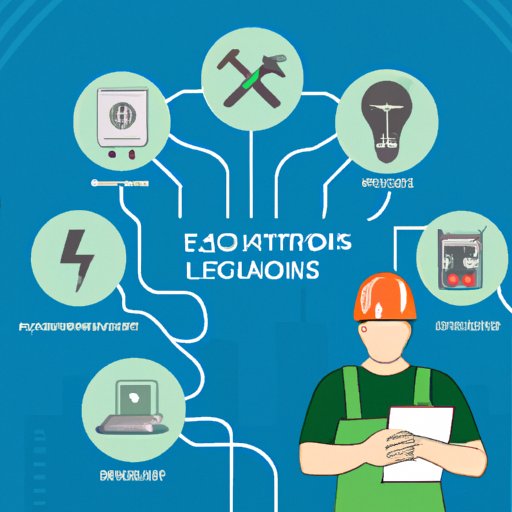
I. Introduction
If you’re looking for a hands-on career that offers job security and plenty of opportunities for growth and advancement, becoming an electrician might be right for you. This guide will provide you with the information you need to get started on your journey to becoming a successful electrician. From the steps needed to begin your career to starting your own business and changing the world, this article covers everything you need to know about becoming an electrician.
II. 7 Steps to Beginning a Career as an Electrician
The following steps are essential to starting a career as an electrician:
A. Research the Field
Before diving into the electrical field, it’s crucial to research the industry to understand what electricians do, what skills are required to succeed and what type of work conditions you can expect. You can research online or talk to an electrician who can give you a clear picture of what a career as an electrician involves.
B. Complete High School or Get a GED
While it is not necessary to earn a college degree, an electrician’s job requires a high level of technical and mathematical skills. Therefore, you should have a high school diploma or equivalent(GED) before pursuing electrician training courses.
C. Enroll in a Technical Training Program
You will need to complete electrician technical training programs to gain knowledge and hands-on experience with electrical equipment and systems. Technical training programs can be found at vocational schools, trade schools, or technical colleges. Electrical training courses provide basic knowledge on electrical safety, fundamentals of electrical systems, mathematics, and blueprint reading among other topics in the field that will surely make you a well-rounded electrician.
D. Gain Experience through an Apprenticeship
An apprenticeship is an essential step to becoming a skilled electrician. During an apprenticeship, you will work under the supervision of a licensed electrician for a period of about four years. During this time, you will learn new skills, take training courses, and be exposed to a wide range of electrical work.
E. Obtain Necessary Certifications and Licenses
Electricians require licensure and certification to prove their knowledge and capability as electricians. While licenses and certification requirements may vary based on state and location, all electricians must obtain proper licenses and certifications to practice their profession legally. Some of the certifications include; journeyman electrician certification, master electrician license, or an electrical contractor’s license.
F. Apply for Jobs and Start Building a Career
Once you complete your apprenticeship(s) and get certified, it is time to start your journey to becoming a successful electrician. You can search for openings in firms or apply for electrical contracts in your location. Volunteering to take small jobs with electrical service providers will also help you build your career as an electrician.
G. Keep Learning and Growing as an Electrician
Electricians need to keep learning and expanding their skills, technological advancements in the field, and new legislation. Continuing education and hard work are essential in the electrical industry if you want to remain at the top of your profession and make a name for yourself.
III. Inside the Life of an Electrician
Before you start your career as an electrician, it’s essential to understand what the job entails.
A. Explanation of the Work Electricians Do
Electricians install and maintain electrical systems, wiring, and equipment in residential, commercial, and industrial buildings. Electricians test and diagnose electrical problems using hand tools, specialized equipment, and computer systems. They are also responsible for ensuring that all electrical equipment and systems meet regulations and safety standards.
B. Job Market and Employment Outlook
The demand for electricians remains high as the construction industry continues to grow. According to the United States Bureau of Labor Statistics, the median annual wage for electricians was $56,180 in May 2019. The demand for electricians is expected to grow by 8% in the decade leading up to 2029, adding approximately 85,900 electricians to the workforce.
C. On-the-Job Expectations
Electricians work on new construction projects, maintenance and repair services, and emergency service calls. They work both indoors and outdoors, depending on the job and work environment. This type of work often requires electricians to work for extended periods, including on evenings and weekends with some clients. Job schedules can change fast, depending on the project timelines.
D. Pros and Cons of Working as an Electrician
- Pros: Electricians earn good salaries, career stability, job security, and the opportunity to work autonomously. They also benefit from job satisfaction from working with their hands and seeing their projects come to life
- Cons: Physically demanding and dangerous work might cause injuries, accidents and electricians to work irregular hours, especially when handling emergency repairs. The job demands full attention to safety precautions; otherwise, the risk of electric shock of other electrical accidents can be high.
IV. Becoming an Electrician: 5 Things to Know Beforehand
Before setting out on the path to becoming an electrician, it is essential to understand some risks and necessary preparations before choosing the field as your career.
A. Necessary Skills and Education
Working satisfactorily as an electrician requires good math skills, problem-solving abilities, and manual dexterity. Electricians must love working with their hands, have sound oral and written communication skills, and work effectively as part of a team. They should also have basic computer skills and comprehend technical electrical drawings, blueprints, and schematics.
B. Physical Demands of the Job
Electricians use ladders, lift and move heavy equipment and tools, and stand for long periods while performing their duties. Working in cramped spaces is also common, so it’s essential to be physically fit for the job.
C. Safety Precautions and Protocols
Electrical work is one of the most dangerous professions. Electricians must adhere to strict safety procedures to avoid electric shock, burns, or other electrical accidents. Wearing personal protective equipment (PPE), such as hard hats, safety glasses, and gloves, is essential when working on live wires.
D. Licensing and Certification Requirements
To work as an electrician legally, you must hold certifications, licenses, or other credentials. These requirements vary by state and jurisdiction, but most jurisdictions require journeymen and master electricians to obtain specific licenses and certifications to operate as electricians.
E. Potential for Hazards and Dangerous Situations
Electricians are susceptible to many hazardous conditions and accidents at work, such as electrocution, electrical burns, or hearing loss. It is, therefore, essential to follow all safety regulations to minimize the risks and hazards that come with the job.
V. How to Start an Electrical Business in 10 Steps
If you are interested in starting your electrical business, here are ten necessary steps to make your plan a reality:
A. Understanding the Market
Before starting your business, you must analyze the market, competitors and have target markets. You must understand the demand for electrical services in your area to remain competitive and attract clients.
B. Creating a Business Plan
Your business plan should outline your plan to develop a successful electrical venture. It should include business goals, objectives, marketing goals, and strategies to assess financial success.
C. Securing Financing and Resources
Starting a business requires capital. You can apply for a bank loan, seek angel investment, or apply for small business loans or grants. After that, look for resources needed to start up – like tools, equipment, and machinery.
D. Getting Licensed and Insured
Before operating as an electrical contractor, ensure you obtain all the necessary licenses, permits and certificates needed to operate legally. Similarly, purchase business insurance and worker’s compensation insurance is vital to provide financial protection should accidents happen at the business site.
E. Building a Team and Infrastructure
As a new business owner, building a team of professionals and establishing an efficient infrastructure is necessary. Setting up an efficient invoicing system, accounting system, and communication channels with your team can streamline business operations.
F. Marketing and Advertising Your Business
Start by creating an online presence through a website, social media platforms, and Google My Business Profile. Utilize search engine optimization(SEO) strategies that produce leads for your business through focused email marketing campaigns, networking and word-of-mouth referrals, and paid advertising if necessary.
G. Managing Finances and Budgets
Managing finances and budgets are critical for all businesses. Knowing how to handle taxes, payroll, bookkeeping, cashflow, and all other finances is necessary. Hiring an accountant or bookkeeper may be necessary to relieve the burden and stress of keeping track of all financial activities in your business.
H. Keeping Up with Industry Standards and New Technology
To stay competitive and updated with industry standards and new technology trends, you must attend relevant workshops, seminars, and training programs. Join electrical trade associations and participate in industry events to stay informed of any changes or advancements in the industry.
I. Providing Excellent Customer Service
Superior customer service starts right from the first interaction with potential clients to the completion of the electrical project. Train your team to deal with clients professionally, solve problems expediently, and work to exceed clients’ expectations.
J. Continually Growing and Expanding Your Business
Always finding ways to grow your business is essential for successful entrepreneurs. Join networking groups, offer new electrical services, participate in charity events throughout the community, and continuously push your boundaries to grow your business.

VI. Electrify Your Career: How Electricians are Changing the World
Electricians have wide-ranging impacts on the world through their career; let’s look at a few ways they are changing the world:
A. Description of Electricians’ Impact on the World
Electricians help in powering communities, hospitals, homes and provide energy for technology platforms, improving business operations, and society activities. Electricians help make electrical devices and systems safer and more efficient, ultimately improving our lives and world.
B. Interviews with Electricians Discussing Their Work
We interviewed a few electricians to get their insights into their work. According to James Kiara, a licensed electrician based in Newark, NJ, “I enjoy installing solar panels for clients because it empowers them to help the environment while reducing energy bills”.
C. Sustainability and Green Energy Initiatives
Electricians play a significant part in the global shift towards sustainable energy use. Electricians who work towards more energy-efficient electrical systems, green energy, and solar power help clients decrease their carbon footprints while reducing energy costs.
D. Improving Public Safety through Electrical Work
Electricians improve public safety by installing electrical circuits, repairing outdoor security lights, and repairing faulty electrical equipment that could cause accidents. As experts in electrical safety, electricians identify potential hazards and fix them, preventing safety incidents that could harm your family, friends, or the community.
VII. The Future of Electrical Work: Where the Industry is Heading
A. Current Trends in the Electrical Industry
One of the significant changes the electrical industry has experienced is the introduction of advanced technologies like Smart Home Systems that maximize energy efficiency and reduce bills. Similarly, the industry has experienced a shift to renewable energy sources, including solar energy.
B. Projected Growth and Changes
The electrical industry is expected to grow, creating more excellent demand for electricians. More advanced technologies like Electric Vehicles, smart homes, and more energy-efficient appliances will become popular, playing a significant role in job growth opportunities for electricians.





